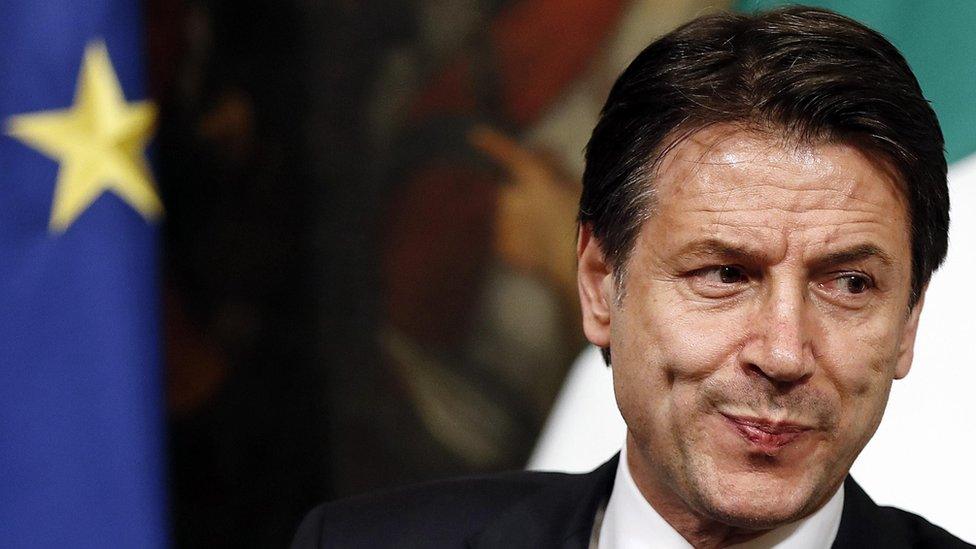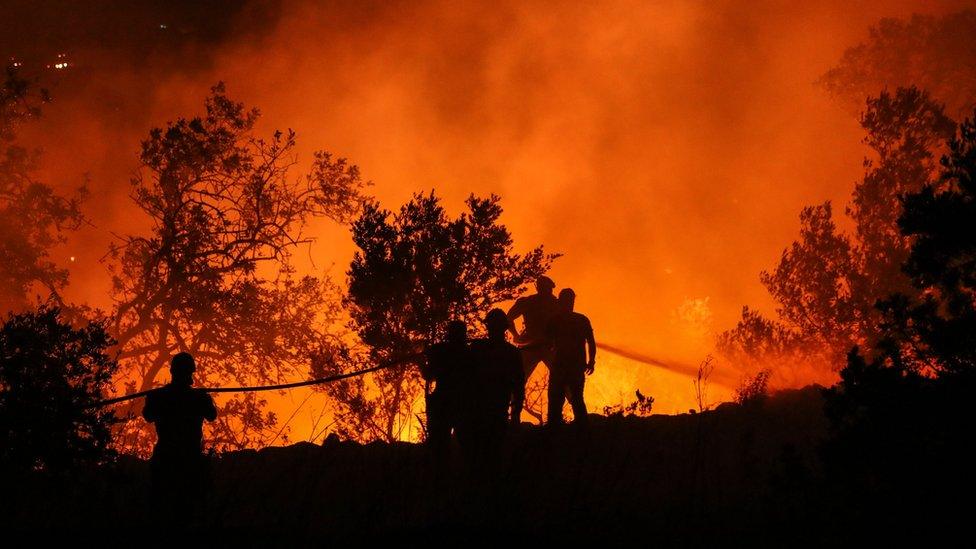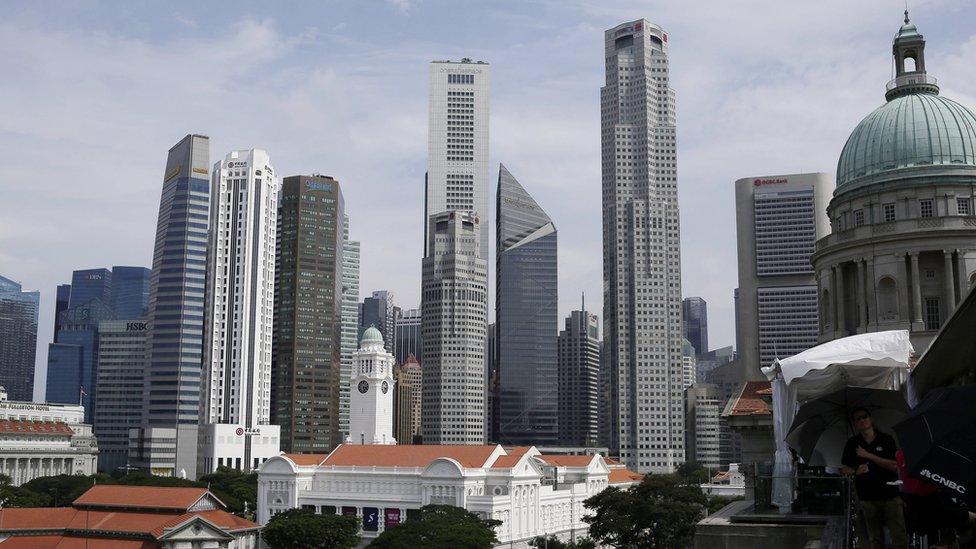Week ahead in the European Parliament
- Published

Former professor Giuseppe Conte has led a populist coalition since last summer
The European Parliament meets in Strasbourg this week with elections heaving slowly into view.
On Tuesday afternoon, Italian Prime Minister Giuseppe Conte will become the latest leader to make a speech to MEPs on the future of the EU.
The timing is rather awkward, with Italy in a diplomatic spat with France and latest figures showing the Italian economy slipped into recession last year.
It comes after Italian Deputy PM Luigi Di Maio met a group of "yellow vest" protestors who are standing in the European elections due in May.
On the legislative front, MEPs will vote on new EU rules governing how governments screen foreign investment, and some no-deal Brexit laws.
These include new laws to ensure "basic connectivity" for airlines and hauliers in the event that the UK were to leave without a deal.
MEPs have proposed amending the airline legislation to give the EU Commission extra leeway to grant temporary exemptions to EU ownership rules.
They have suggested that exemptions could be granted to certain airlines with "credible plans" to change their ownership structure in the "shortest possible time".
On Wednesday, they will also vote on whether to ratify the EU's proposed trade deal, external with Singapore.
Here's what's coming up this week...
Monday
On Monday afternoon, MEPs will debate two fishing agreements which face a vote on Tuesday.
The first is a multi-year fishing plan for an area of the Atlantic Sea located along the western coast of the EU.
The second is a revision of EU's 2007 fishing deal with the Ivory Coast, under which the bloc pays a fee to allow its fishing boats access to the country's waters.
Under the deal, the EU will pay €682,000 per year to the Ivory Coast, including payments made to help the country develop its local fisheries.
After this they will debate three advisory reports from the constitutional affairs committee about how various aspects of the EU's treaties are implemented.
After a debate about the powers of the European Ombudsman, they will also discuss "the right of peaceful protest and the proportionate use of force".
It follows controversy over the use of anti-riot LBD launchers - also known as "flash-balls" - against the "yellow vests" protesters in France.
A French court ruled earlier this month that police could continue using the guns because of the threat of violence.
In the evening, there will be short presentations of so-called "own initiative" reports from parliamentary committees with ideas for EU policy.
One of them - on the future of artificial intelligence - calls for a ban on EU funds going to companies that are developing artificial consciousness.
Tuesday
The day begins with a debate on an overhaul of the EU's programme for co-ordinating emergency responses to natural disasters.
Under the changes, the EU will be able to provide additional funds towards leasing equipment required in an emergency if national contributions fall short.

The EU's emergency support scheme was severely tested last year by a series of forest fires
They will also discuss a report from the environment committee which calls on EU governments to reduce farmers' dependency on chemical pesticides.
Following this, they will debate a report on cross-border health treatment and new EU quality standards for treated sewage water used to irrigate farms.
After the lunchtime voting session, MEPs will debate the latest in the Syrian civil war.
It comes after last week President Trump said territory held by the Islamic State group in Syria and Iraq could be "100%" liberated as early as this week.
After this they will debate a report from the foreign affairs committee on the EU accession efforts of Bosnia and Herzegovina.
A European Commission annual review of the country's progress published in April last year found little progress had been made during 2017.
Then comes the speech from Italian Prime Minister Giuseppe Conte, followed by two rounds of speakers drawn from the MEPs.
He will be the seventeenth European leader to make a speech on the future of the EU in a series organised in this run-up to this May's European elections.
In the evening they will discuss the EU's trade deal with Singapore, ahead of the final ratification vote on Wednesday.
The deal will eventually remove all tariffs on goods traded between the two, and give EU companies better market access in sectors like telecommunications.

Over 10,000 EU companies use Singapore as a hub within Asia
Provisions on commercial arbitration are now in a separate agreement, after the EU's top court ruled in 2017 that they would need national approval.
This separate agreement also faces a ratification vote on Wednesday - and will need national approval afterwards.
The evening will see debates with the European Commission on a series of oral questions asked by various parliamentary committees.
These will address topics such as women's rights, the rights of intersex people and the use of cannabis for medical reasons.
Wednesday
The morning will open with a debate on how the EU should implement the UN's sustainable development goals.
The European Commission issued a 'reflection paper' on the matter earlier this month.
After this, they will discuss the budget for various infrastructure and regional development funds over the 2021-2017 funding period.
MEPs on the regional development committee have proposed that cuts to regional funds should be reversed, with funding maintained at 2018 levels.
After a first voting session of the day at lunchtime, MEPs will begin the afternoon sitting with debates on fair taxation and legislation to allow joint clinical assessment of new health products at EU level.
The second voting session of the day will see them vote on emergency legislation to allow hauliers and airlines to continue operating temporarily in the event of a no-deal Brexit.
MEPs have proposed to amend both laws, meaning further consultation with national ministers will be required before they can be added to the statute book.
In the evening MEPs will debate EU-wide standards for the screening of investments from non-EU countries on the grounds of public security.
The European Commission announced the proposals in 2017 amid concern over rising investment into Europe from countries such as China.
Under the plans, national governments will retain the power to review and block investments but existing screening schemes will have to meet certain EU-wide standards.
Notably, the European Commission will gain the right to issue advisory opinions on investments, as well as to more information about which are being screened at a national level.
They will also discuss an update to EU law governing the exchange of information between automated motorway toll booths.
Thursday
The final day of the sitting opens with a debate on a report from the agriculture committee urging animal transport conditions to be linked to EU farm subsidy payments.
The report also says journey times to transport live animals should be reduced "as far as possible".
It follows reports that Polish police are investigating an abattoir suspected of illegally trafficking in sick cattle.
In the morning they will also debate this month's crop of human rights motions - which focus on Chechnya, Zimbabwe and women's rights activists in Saudi Arabia.
At the voting session they will also vote on new EU rules on cross-border transaction fees charged for payments into and out of the euro.
The change aims to bring down the cost of such fees and oblige banks to offer greater transparency about the charges.
MEPs have already reached an informal agreement on the changes with national governments.
Please note: This agenda is subject to modification at the opening of the session on Monday afternoon.
A guide to the European Parliament's plenary sessions can be found here.